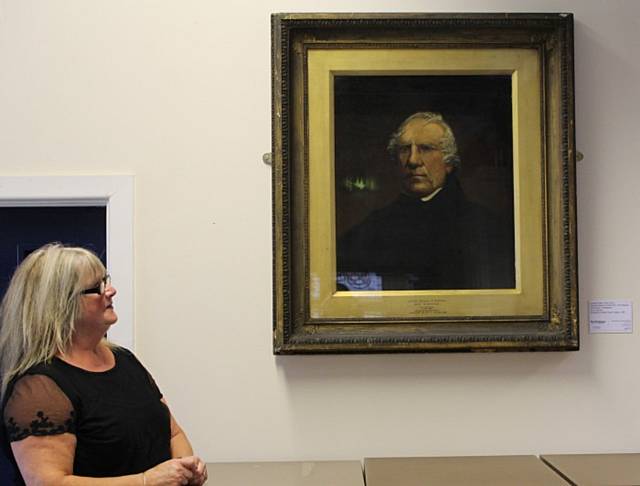Painting of radical reformer returned to his birthplace
Date published: 06 September 2014

Middleton Township Chair Councillor June West unveils the portrait of Samuel Bamford by Charles Potter
A painting of one of Middleton’s most famous sons will take pride of place after being unveiled at Middleton Library on Thursday 4 September.
The painting,entitled Samuel Bamford (1788–1872), 'The Radical', Silk Weaver of Middleton by Charles Potter, is part of the borough’s Art Gallery Collection.
However, after calls by members of the public to have a portrait of Sam Bamford in Middleton Library following the building’s restoration, the library now boasts a portrait of one of its famous sons.
Radical reformer Samuel Bamford was born in Middleton in1788, one of five children born to Daniel Bamford, a muslin weaver, part-time teacher, and later master of the Salford workhouse, and his wife, Hannah.
Having also become a weaver and then a warehouseman in Manchester, in 1817 Samuel Bamford was imprisoned in the New Bailey Prison in Salford on suspicion of high treason on account of his political activities. After promising to be of future good behaviour he was released and was then able to return to live in his cottage at Middleton with his wife Jemima.
In March 1817 Samuel Bamford addressed a large crowd on Cronkeyshaw Common in Rochdale. The meeting was called to find a way to "obtain a reform on the Principles of Universal Suffrage, annual Parliaments and election by ballot."
In August 1819, Samuel Bamford led a group from Middleton to St Peter's Fields in Manchester, to attend a meeting pressing for parliamentary reform and the repeal of the Corn Laws. On the orders of magistrate Reverend Hay, the attending cavalry opened fire on the crowd, causing the deaths of 11 demonstrators in the panic, and serious injury to more than 400. This event has since been known as the Peterloo Massacre. He was again arrested and charged with treason. And despite no evidence that he or any of his group had been involved in the violence, he was found guilty of inciting a riot and sentenced to a year in prison. Samuel Bamford came to be seen as a voice for radical reform, but opposed to any activism that involved physical force.
Samuel Bamford also wrote poems in Lancashire dialect, several showing sympathy with the conditions of the working class, and his Passages in the Life of a Radical (1840 – 1844) is an authoritative history of the condition of the working classes in the years after the Battle of Waterloo. He also compiled The Dialect of South Lancashire (Manchester: John Heywood, 1850).
He died at Harpurhey on 13 April 1872 and was given a public funeral, attended by thousands. A memorial obelisk was unveiled in Middleton Cemetery in 1877. Part of the inscription reads: “Bamford was a reformer when to be so was unsafe, and he suffered for his faith.”
Do you have a story for us?
Let us know by emailing news@rochdaleonline.co.uk
All contact will be treated in confidence.
Most Viewed News Stories
- 1Royton haulage firm fined after Rochdale dad went to work and didn’t come home
- 2Six men arrested in Rochdale child exploitation investigation
- 3Newhey's Char Steakhouse and Bank Chamber close with immediate effect
- 4Two men arrested after police chase ends up in Middleton river
- 5Obituary: Jean Ashworth
To contact the Rochdale Online news desk, email news@rochdaleonline.co.uk or visit our news submission page.
To get the latest news on your desktop or mobile, follow Rochdale Online on Twitter and Facebook.


